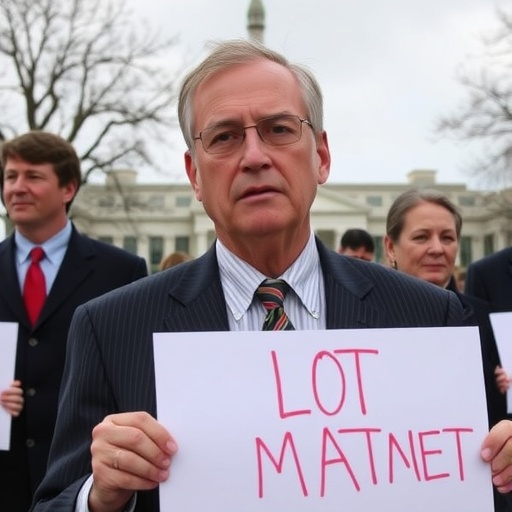Democrats Block GOP Funding Extension: U.S. Enters 11th Government Shutdown as Budget Deadlock Deepens
In a tense late-night vote on Capitol Hill, Democrats decisively blocked a Republican-led proposal to avert a government shutdown, thrusting the United States into its 11th such crisis since 1976 and extending uncertainty for millions of federal workers and essential services. The rejection, which occurred in the Senate by a narrow 51-49 margin, highlights the deepening partisan divide over budget priorities, with Democrats decrying the GOP plan as insufficient on key social programs and Republicans accusing their counterparts of political posturing.
- Senate Vote Breakdown: Democrats Unite to Reject Short-Term GOP Fix
- Federal Workers Feel the Squeeze: Personal Toll of the Prolonged Shutdown
- Budget Battle Roots: Immigration and Spending at the Heart of the Impasse
- Expert Voices: Economists Warn of Lasting Damage from Shutdown Prolongation
- Pathways Forward: Bipartisan Talks and Public Pressure Shape Next Moves
This latest standoff comes as the fiscal year deadline loomed, leaving non-essential government operations shuttered and furloughing over 800,000 federal employees nationwide. The government shutdown, now in its early hours, echoes previous impasses but carries heightened stakes amid ongoing economic recovery efforts post-pandemic. Lawmakers from both sides expressed frustration, but no immediate resolution appears in sight, raising alarms about prolonged disruptions to everything from national parks to veterans’ benefits.
Senate Vote Breakdown: Democrats Unite to Reject Short-Term GOP Fix
The pivotal Senate vote unfolded under the glare of C-SPAN cameras, with Senate Majority Leader Chuck Schumer (D-NY) rallying his caucus to oppose the Republican measure. Sponsored by Senate Minority Leader Mitch McConnell (R-KY), the proposal sought a three-month extension of current funding levels at $1.7 trillion, avoiding immediate cuts but sidestepping deeper reforms demanded by Democrats on issues like child care subsidies and climate initiatives.
“This isn’t a solution; it’s a surrender to inaction,” Schumer declared on the floor, emphasizing that the bill failed to address rising inflation’s toll on working families. On the Republican side, McConnell fired back, stating, “Democrats are holding the American people hostage over partisan demands, risking another unnecessary shutdown when compromise was within reach.” The vote saw all Democrats present voting no, joined by one Republican defector, underscoring the chamber’s razor-thin margins in this divided Congress.
Behind the scenes, negotiations had dragged on for weeks in closed-door sessions, but irreconcilable differences emerged over spending caps. Republicans pushed for stricter enforcement of the 2023 debt ceiling deal, aiming to trim $50 billion from discretionary budgets, while Democrats advocated for an additional $20 billion in emergency aid for disaster relief following recent wildfires in the West. This clash has paralyzed the Senate, where filibuster rules require 60 votes for most legislation, making bipartisan buy-in essential yet elusive.
Federal Workers Feel the Squeeze: Personal Toll of the Prolonged Shutdown
As the government shutdown stretches into its second day, the human cost is becoming starkly apparent. Federal employees, from IRS auditors in Washington, D.C., to park rangers in Yellowstone, are facing unpaid wages and mounting bills. According to the Office of Personnel Management, this shutdown could affect up to 2.1 million active-duty military personnel indirectly through delayed support services, though troops remain paid via contingency funds.
Take Sarah Jenkins, a 42-year-old Smithsonian curator furloughed for the third time in five years. “We’ve tightened our belts before, but with kids in college and groceries up 20% this year, this feels different,” Jenkins shared in an interview from her Maryland home. Her story is emblematic of broader impacts: the Partnership for Public Service estimates that each week of shutdown costs the economy $1.5 billion in lost productivity and wages.
Essential services, however, persist. Air traffic controllers and border patrol agents continue working without pay, protected by laws mandating their operations. Yet, backlogs are mounting—veterans’ claims processing at the Department of Veterans Affairs has already slowed by 15%, per internal reports, potentially delaying benefits for 9 million enrollees. In coastal states like Florida, National Oceanic and Atmospheric Administration (NOAA) monitoring of hurricanes is at risk, with satellite data updates paused, heightening vulnerabilities as the 2024 storm season ramps up.
- Key Affected Agencies: Department of Defense (support staff furloughed), Environmental Protection Agency (permitting halted), and Small Business Administration (loan approvals frozen).
- Economic Ripple Effects: Consumer confidence dips, with a Pew Research poll showing 62% of Americans blaming Congress equally for both parties.
- Historical Precedent: The 2018-2019 shutdown, the longest at 35 days, cost $11 billion; experts warn this one could surpass that if unresolved by mid-October.
Democrats have highlighted these stories in floor speeches, arguing that the Republicans‘ rigid stance exacerbates inequality, while GOP leaders counter that long-term fiscal discipline prevents future crises.
Budget Battle Roots: Immigration and Spending at the Heart of the Impasse
The current budget deadlock isn’t born in a vacuum; it’s rooted in long-simmering tensions over immigration reform and federal spending priorities. Republicans, emboldened by midterm gains, have tied funding extensions to stricter border security measures, including $25 billion for wall expansions and asylum restrictions. Democrats view this as a non-starter, insisting on pathways to citizenship for Dreamers and increased refugee allocations.
“We’re not going to fund a wall of division when families are separated at the border,” said Sen. Elizabeth Warren (D-MA), a vocal critic of the GOP plan. On the flip side, Sen. Ted Cruz (R-TX) argued, “Securing our borders is non-negotiable; Democrats’ refusal endangers national security amid record migrant encounters.” Fiscal hawks within the Republican conference, like the House Freedom Caucus, have further complicated matters by demanding offsets for any new spending, targeting programs like Medicaid expansion under the Affordable Care Act.
Economically, the standoff intersects with broader concerns. The Congressional Budget Office projects the U.S. deficit at $1.9 trillion for 2024, fueling Republican calls for austerity. Yet, Democrats point to underfunded infrastructure from the 2021 Bipartisan Infrastructure Law, where only 40% of allocated funds have been disbursed due to bureaucratic snarls now worsened by the shutdown. This impasse also delays implementation of the CHIPS Act, stalling semiconductor manufacturing grants critical for competing with China.
In the House, Speaker Mike Johnson (R-LA) has vowed to bring the Senate-rejected bill to a floor vote, but with a slim majority, passage remains uncertain. Bipartisan talks, mediated by the Problem Solvers Caucus, have yielded incremental progress on disaster aid but falter on core budget items. As one anonymous Senate aide noted, “Pride and polls are driving this more than policy—everyone’s eyeing the 2024 elections.”
Expert Voices: Economists Warn of Lasting Damage from Shutdown Prolongation
Outside the beltway, economists and policy analysts are sounding alarms about the government shutdown‘s cascading effects. Dr. Maya MacGuineas, president of the Committee for a Responsible Federal Budget, warned in a recent op-ed, “Each day of this shutdown erodes public trust and adds unnecessary billions to the national debt through emergency borrowing.” Her organization estimates that if the shutdown lasts beyond two weeks, GDP growth could shave 0.2 percentage points in the fourth quarter.
From a political lens, Brookings Institution fellow William Galston observed, “This is the 11th shutdown, but the first in a post-January 6 era where polarization feels existential. Democrats are betting on public outrage to force GOP concessions, but history shows shutdowns hurt the party in power.” Indeed, Gallup tracking shows congressional approval at a dismal 18%, with independents disproportionately frustrated by the spectacle.
International repercussions loom as well. The State Department’s paused visa processing has stranded diplomats and delayed trade deals, potentially costing exporters $500 million monthly, per U.S. Chamber of Commerce data. In Europe, allies like the UK are watching closely, with Prime Minister Keir Starmer’s government expressing concern over U.S. reliability in NATO funding commitments tied to the budget.
Nonprofit leaders, such as the National Low Income Housing Coalition, decry the freeze on HUD programs, which could leave 100,000 families without rental assistance vouchers this month. “This isn’t just politics; it’s people losing homes,” coalition director Diane Yentel stated in a press release.
Pathways Forward: Bipartisan Talks and Public Pressure Shape Next Moves
As the government shutdown grinds on, glimmers of hope emerge from unlikely quarters. President Biden, in a White House address, urged Congress to “put people over politics,” hinting at executive actions to mitigate some impacts, such as reallocating funds for essential pay. Meanwhile, a group of moderate senators from both parties, including Susan Collins (R-ME) and Mark Warner (D-VA), is pushing a compromise bill that bundles border funding with Democratic priorities like opioid crisis response.
Public pressure is mounting, with protests planned outside the Capitol and a coalition of business leaders, including Amazon and Walmart CEOs, lobbying for swift resolution to avert holiday supply chain disruptions. If talks stall further, the shutdown could extend into November, overlapping with lame-duck sessions post-election and complicating the next president’s transition.
Looking ahead, analysts predict a eventual deal, perhaps modeled after the 2013 shutdown resolution via a clean continuing resolution. But the scars—eroded trust, ballooning costs—will linger, underscoring the fragility of America’s divided governance. With midterm reflections still fresh, both Democrats and Republicans face a reckoning: can compromise reclaim Capitol Hill, or will shutdowns become the new normal in budget battles?
(This article will be updated as negotiations progress.)








